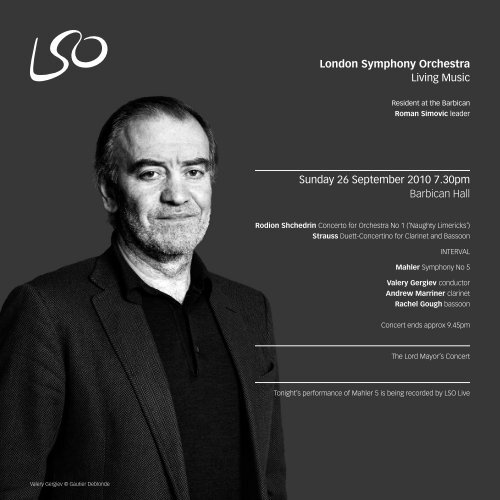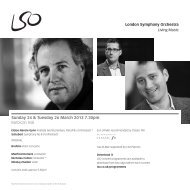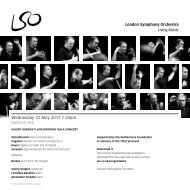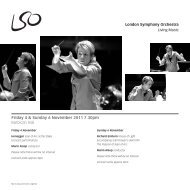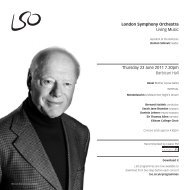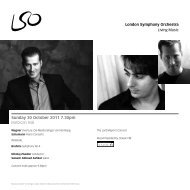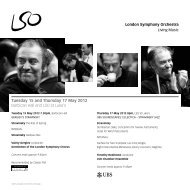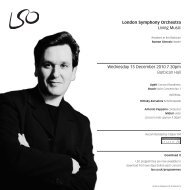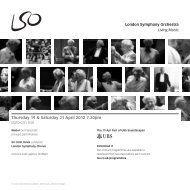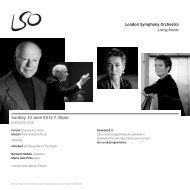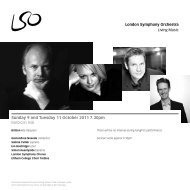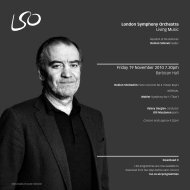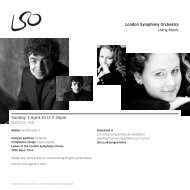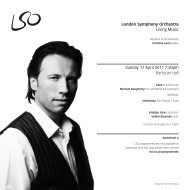26 September programme - London Symphony Orchestra
26 September programme - London Symphony Orchestra
26 September programme - London Symphony Orchestra
Create successful ePaper yourself
Turn your PDF publications into a flip-book with our unique Google optimized e-Paper software.
Valery Gergiev © Gautier Deblonde<br />
<strong>London</strong> <strong>Symphony</strong> <strong>Orchestra</strong><br />
Living Music<br />
Resident at the Barbican<br />
Roman Simovic leader<br />
Sunday <strong>26</strong> <strong>September</strong> 2010 7.30pm<br />
Barbican Hall<br />
Rodion Shchedrin Concerto for <strong>Orchestra</strong> No 1 (‘Naughty Limericks’)<br />
Strauss Duett-Concertino for Clarinet and Bassoon<br />
INTERVAL<br />
Mahler <strong>Symphony</strong> No 5<br />
Valery Gergiev conductor<br />
Andrew Marriner clarinet<br />
Rachel Gough bassoon<br />
Concert ends approx 9.45pm<br />
The Lord Mayor’s Concert<br />
Tonight’s performance of Mahler 5 is being recorded by LSO Live
Welcome From The Lord Mayor<br />
Welcome to the second of the LSO’s opening concerts of<br />
the 2010/11 season, conducted by the <strong>Orchestra</strong>’s Principal<br />
Conductor Valery Gergiev.<br />
As many of you will know, the LSO and the Cricket Foundation are<br />
the principal beneficiary charities of the 2010 Lord Mayor’s Appeal.<br />
I am delighted to welcome The Lord Mayor, Alderman Nick Anstee,<br />
to tonight’s concert; on behalf of everyone at the LSO, I would like to<br />
thank him for proposing that music and cricket could come together<br />
in this way to benefit young people. Turn to page 12 to read more<br />
about what the appeal has achieved over the last 12 months – and<br />
don’t forget, there’s still time to donate!<br />
Tonight’s concert continues Valery Gergiev’s survey of the works<br />
of his compatriot, Rodion Shchedrin. We are honoured that Rodion<br />
Shchedrin is with us tonight and look forward to discovering more of<br />
his music later this season.<br />
Tonight, two of the <strong>Orchestra</strong>’s long-standing members, Principal<br />
Clarinet Andrew Marriner and Principal Bassoon Rachel Gough, take<br />
centre stage in Richard Strauss’s charming Duett-Concertino.<br />
After the interval, the <strong>Orchestra</strong> performs Mahler’s Fifth <strong>Symphony</strong>,<br />
marking the start of a season in which the LSO and Valery Gergiev will<br />
perform Mahler symphonies world-wide.<br />
Kathryn McDowell<br />
LSO Managing Director<br />
It is a pleasure to welcome you all to the Lord Mayor’s annual<br />
concert with the LSO, the <strong>Orchestra</strong> of the City. The City of <strong>London</strong><br />
Corporation is proud to support this world class ensemble in<br />
its residency at the Barbican and also recognises its role as an<br />
international ambassador for the City.<br />
This year I have chosen LSO Discovery’s On Track <strong>programme</strong> as one<br />
of the principal beneficiaries of my charitable Appeal, Pitch Perfect.<br />
Together with the Cricket Foundation’s StreetChance <strong>programme</strong>,<br />
Pitch Perfect aims to generate significant funds to bring musical<br />
and cricketing opportunities into schools and their communities in<br />
<strong>London</strong>’s most challenging boroughs. You will find a brochure on<br />
your seats tonight which explains more fully the work of these two<br />
wonderful organisations that are working to reach 75,000 children<br />
over the next five years.<br />
I wish you a very enjoyable evening and if the music touches you<br />
tonight, please consider supporting the musicians of the future<br />
through Pitch Perfect.<br />
Nick Anstee<br />
Lord Mayor of the City of <strong>London</strong><br />
Rodion Shchedrin (b 1932)<br />
Concerto for <strong>Orchestra</strong> No 1 (‘Naughty Limericks’) (1963)<br />
Shchedrin is one of very few composers for whom the concerto for<br />
orchestra has been more than a one-off event. Some, such as the<br />
Italian Goffredo Petrassi, who composed eight examples between the<br />
1930s and 1970s, have followed Hindemith’s cue, producing frankly<br />
recreational music, designed primarily to show off the qualities of<br />
the modern orchestra. Others, such as Shchedrin’s compatriot and<br />
near-contemporary Alfred Schnittke, have preferred the closely related<br />
genre of concerto grosso, deriving inspiration principally from the<br />
fusion of old and new styles.<br />
In Shchedrin’s five concertos for orchestra to date, there is a bit of<br />
both those trends. Each work carries a subtitle referring to an aspect<br />
of traditional Russian culture, and at the same time each showcases<br />
the possibilities of the contemporary orchestra. The first was<br />
composed in 1963 and premiered that year at the Warsaw Autumn<br />
Festival under Gennady Rozhdestvensky. Soon taken up in the United<br />
States by Bernstein, it has gone on to become one of Shchedrin’s<br />
most widely heard scores.<br />
Replete with witty musical tricks, including honky-tonk piano and a<br />
naughty-boy final cadence, this eight-minute tour de force is a riot<br />
of colourful incident – something like Malcolm Arnold crossed with<br />
Charles Ives, perhaps, with nods to Copland, Penderecki and western<br />
pop along the way. Pre-empting any attempts at more sophisticated<br />
analysis, Shchedrin has summed up the form as ‘like many variations<br />
on many themes’.<br />
The subtitle ‘Naughty Limericks’ points to roots in folk culture, as if to<br />
remind Soviet authorities that subversiveness and high spirits could<br />
in fact be politically correct. In fact ‘Limericks’ is a loose rendition<br />
of the untranslatable Russian chastushki, which denotes animated,<br />
humorous village songs, sometimes with indecent texts and often<br />
improvised around only a few notes. This was a 20th-century genre<br />
rather than one with a long history, and as the composer later<br />
stressed, ‘even hallowed names such as Marx, Lenin and Stalin<br />
could be sent up in the chastushka’. Had the political climate of the<br />
1960s allowed it, he would have chosen the adjective rugatel’nïye<br />
(‘indecent’) rather than ozornïye (literally ‘mischievous’), or so he<br />
claimed.<br />
In this modern reincarnation of the chastushka it is as though, inspired<br />
by the sensational return visit of Stravinsky to his homeland the<br />
previous year, Shchedrin was imagining what the Stravinsky of the<br />
1910s might have gone on to compose had he never emigrated, and<br />
had he not deflected from his Russian roots into cool, cosmopolitan<br />
neoclassicism.<br />
Programme note and profile © David Fanning<br />
David Fanning is Professor of Music at the University of Manchester.<br />
He is an expert on Shostakovich, Nielsen and Soviet music. He is also<br />
a reviewer for the Daily Telegraph, Gramophone Magazine and<br />
BBC Radio 3.<br />
I still today continue to be convinced that<br />
the decisive factor for each composition is<br />
intuition. As soon as composers relinquish<br />
their trust in this intuition and rely in its<br />
place on musical ‘religions’ such as serialism,<br />
aleatoric composition, minimalism or<br />
other methods, things become problematic.<br />
Rodion Shchedrin<br />
Music’s better shared!<br />
There’s never been a better time to bring your friends to an LSO<br />
concert. Groups of 10+ receive a 20% discount on all tickets, plus a<br />
host of additional benefits. Call the dedicated Group Booking line on<br />
020 7382 7211, visit lso.co.uk/groups, or email<br />
groups@barbican.org.uk.<br />
The LSO is delighted to welcome the following group tonight:<br />
Inscape Study Tours<br />
2 Welcome<br />
Kathryn McDowell © Camilla Panufnik Programme Notes 3
Rodion Shchedrin & Valery Gergiev<br />
Russian Compatriots<br />
Rodion Shchedrin<br />
Valery Gergiev<br />
1945–50<br />
Joined the<br />
Moscow<br />
Choral School<br />
16 Dec 1932<br />
Born, Moscow<br />
1950–55<br />
Trained at<br />
the Moscow<br />
Conservatory<br />
1958<br />
Married<br />
ballerina Maya<br />
Plisetskaya<br />
2 May 1953<br />
Born, Moscow<br />
Valery Gergiev’s Rodion Shchedrin<br />
1960<br />
The Little<br />
Humpbacked<br />
Horse, Moscow<br />
1961<br />
Not only love,<br />
Moscow<br />
1963<br />
Naughty Limericks,<br />
Warsaw<br />
Fri 19 Nov 2010 Piano Concerto No 4 (‘Sharp Keys’) with Olli Mustonen<br />
Wed 23 & Thu 24 Mar 2011 Lithuanian Saga<br />
1964–69<br />
Professor of Composition,<br />
Moscow Conservatory<br />
1967<br />
Carmen Suite,<br />
Moscow<br />
1968<br />
The Chimes,<br />
New York<br />
1969<br />
Becomes freelance<br />
composer<br />
1968<br />
Refused to sign open<br />
letter sanctioning the<br />
invasion of Warsaw Pact<br />
troops in Czechoslovakia<br />
1972<br />
Anna Karenina,<br />
Moscow<br />
1973<br />
Succeeds Shostakovich<br />
as President of the Union<br />
of Composers of the<br />
Russian Federation<br />
1972<br />
Receives the USSR<br />
State Prize<br />
1960 1970 1980 1990 2000<br />
1972–77<br />
Trained at the Leningrad<br />
Conservatory<br />
1977<br />
Dead Souls,<br />
Moscow<br />
1976<br />
Wins Herbert von Karajan<br />
Conducting Competition,<br />
Berlin<br />
1977<br />
Appointed Assistant<br />
Conductor to Kirov<br />
Opera<br />
1978<br />
Kirov debut<br />
– War and<br />
Peace<br />
1981–85<br />
Appointed Chief<br />
Conductor of the<br />
Armenian Philharmonic<br />
<strong>Orchestra</strong><br />
1989<br />
Khorovody,<br />
Tokyo<br />
1985<br />
Honorary member of the<br />
International Music Council<br />
1983<br />
Honorary member of the<br />
Academy of Fine Arts, GDR<br />
1984<br />
Receives the Lenin Prize<br />
4 Programme Notes Programme Notes 5<br />
1985<br />
UK debut at the<br />
Lichfi eld Festival<br />
1988<br />
The Sealed<br />
Angel,<br />
Moscow<br />
1988<br />
LSO debut<br />
1989<br />
Member of Berlin<br />
Arts Academy<br />
1988<br />
Appointed Chief<br />
Conductor and<br />
Artistic Director<br />
of the Mariinsky<br />
Theatre<br />
1990<br />
Old Russian Circus<br />
Music, Chicago<br />
1991<br />
USA debut with<br />
War and Peace<br />
1994<br />
Lolita, Stockholm;<br />
Sotto voce Concerto,<br />
<strong>London</strong>;<br />
Trumpet Concerto,<br />
Pittsburgh<br />
1993<br />
Receives Dmitri<br />
Shostakovich Prize<br />
1998<br />
Four Russian Songs,<br />
<strong>London</strong><br />
1997<br />
Honorary Professor,<br />
Moscow Conservatory<br />
1997<br />
Receives Dmitri<br />
Shostakovich Prize<br />
1998<br />
Fifth Piano Concerto,<br />
Los Angeles<br />
1999<br />
Marries Natalya Debisova<br />
1995–2008<br />
Appointed Principal Conductor<br />
of the Rotterdam Philharmonic<br />
<strong>Orchestra</strong><br />
1996<br />
Russian government appoints<br />
him overall Director of the<br />
Mariinsky Theatre<br />
1997<br />
Appointed Principal Guest<br />
Conductor of the Metropolitan<br />
Opera, New York<br />
2002<br />
Dialogues with<br />
Shostakovich,<br />
Pittsburgh<br />
2003<br />
Sixth Piano Concerto,<br />
Amsterdam<br />
2002<br />
Order for Service to<br />
the Russian State:<br />
Third Degree<br />
2005<br />
2008<br />
Honorary Professor, Honorary Professor,<br />
St Petersburg State Central Conservatory<br />
Conservatory of Music, Beijing<br />
2003<br />
UNESCO Artist for Peace<br />
2003<br />
Order for Service to the<br />
Russian State: Third Degree<br />
2003<br />
First performance<br />
of Wagner’s Ring in<br />
Russia for 90 years<br />
2006<br />
Boyarina Morozova,<br />
Moscow<br />
2007<br />
Order for Service to<br />
the Russian State:<br />
Fourth Degree<br />
2006<br />
Opens the new<br />
Mariinsky Concert<br />
Hall<br />
2008<br />
Order for Service to<br />
the Russian State:<br />
Fourth Degree<br />
2004<br />
2007<br />
Second appearance Takes Mariinsky<br />
with the LSO Wagner’s Ring to<br />
New York<br />
2005<br />
Appointed 15th Principal<br />
Conductor of the LSO<br />
(fi rst offi cial concert<br />
23 Jan 07)<br />
2010<br />
Named one of the 100 Most<br />
Infl uential People in the World<br />
by Time magazine
Rodion Shchedrin<br />
The Man<br />
The generation of Soviet composers after Shostakovich produced<br />
charismatic and exotic figures such as Galina Ustvolskaya, Alfred<br />
Schnittke and Sofiya Gubaydulina, whose music was initially<br />
controversial but then gained cult status. At the other end of the<br />
stylistic spectrum it featured highly gifted craftsmen such as Boris<br />
Tishchenko, Boris Chaykovsky and Mieczysław Weinberg, all of whom<br />
worked more or less within the parameters laid down by Shostakovich<br />
and were highly respected in their heyday but gradually fell from<br />
favour.<br />
Somewhere in between we can locate Rodion Shchedrin – an<br />
individualist with a broader and more consistent appeal, who could<br />
turn himself chameleon-like to virtuoso pranks or to profound<br />
philosophical reflection, to Socialist Realist opera or to folkloristic<br />
concertos for orchestra (a particular speciality), to technically solid<br />
preludes and fugues, to jazz, and, when he chose, even to twelve-note<br />
constructivism.<br />
Trained at Moscow Conservatoire in the 1950s, as a composer under<br />
Yuri Shaporin and as a pianist under Yakov Flier, in the early<br />
years of the Post-Stalinist Thaw Shchedrin was one of<br />
the first to speak out against the constraints of<br />
musical life in the Soviet Union. He went on to play<br />
a significant administrative role in the country’s<br />
musical life, heading the Russian Union of Composers<br />
from 1973 to 1990. Married since 1958 to the star<br />
Soviet ballerina Maya Plisetskaya, he established a<br />
significant power-base from which he was able to promote<br />
not only his own music but also that of others – such as<br />
Schnittke, whose notorious First <strong>Symphony</strong> received its<br />
sensational premiere only thanks to Shchedrin’s support.<br />
An unashamed eclectic, and suspicious of dogma from<br />
either the arch-modernist or arch-traditionalist wings of<br />
Soviet music, Shchedrin occupied a not always comfortable<br />
position, both in his pronouncements and in his creative<br />
work. With one foot in the national-traditional camp and the<br />
other in that of the internationalist-progressives, he was<br />
tagged with the unkind but not unfair label of the USSR’s<br />
6 Programme Notes<br />
‘official modernist’. From 1992 he established a second<br />
home in Munich, but he still enjoyed official favour in post-Soviet<br />
Russia, adding steadily to his already impressive roster of prizes.<br />
Shchedrin has summed up his artistic credo as follows: ‘I continue<br />
to be convinced that the decisive factor for each composition<br />
is intuition. As soon as composers relinquish their trust in this<br />
intuition and rely in its place on musical ‘religions’ such as serialism,<br />
aleatoric composition, minimalism or other methods, things become<br />
problematic.’<br />
Rodion Shchedrin © www.lebrecht.co.uk<br />
Richard Strauss (1864–1949)<br />
Duett-Concertino for Clarinet, Bassoon, Strings and Harp (1947)<br />
Allegro moderato –<br />
Andante –<br />
Rondo: allegro non troppo<br />
Andrew Marriner clarinet<br />
Rachel Gough bassoon<br />
Strauss’s last work for orchestra is a lovely example of the serene and<br />
apparently effortless creativity characteristic of the ‘Indian Summer’<br />
of his 80s. In exile in Switzerland – life in Germany in the first years<br />
after the end of the war was very difficult for him – he wrote the<br />
Duett-Concertino for the chamber orchestra of the Italian-Swiss Radio<br />
in Lugano, where it was first performed in April 1948. The soloists on<br />
that occasion were the principal clarinet and bassoon of the Swiss<br />
ensemble, although the score is actually dedicated to<br />
Hugo Burghauser, a Vienna Philharmonic bassoonist who had<br />
emigrated to New York. Writing to Burghauser with the dedication,<br />
Strauss revealed that there is a story behind the work: a dancing<br />
princess is alarmed by the grotesque attentions of a bear who<br />
however, when she dances with him, turns out to be a prince.<br />
‘So you too, Burghauser,’ the composer added, ‘become a prince<br />
at last and everything ends happily.’<br />
Constructed in three movements performed without a break, the<br />
Concertino makes complete musical sense without reference to any<br />
beauty-and-the-beast kind of scenario – not least because it is so<br />
firmly held together by the little five-note flourish introduced by a<br />
sextet of solo strings in the opening bars. Even so, since the storyline<br />
is so clearly and at the same time so poetically presented, it is<br />
tempting to follow the interaction of the two principal characters<br />
through at least the first two movements. After the string sextet<br />
introduction with the all-important five-note flourish, the clarinetprincess<br />
makes a beautifully poised entry on an exquisitely supple<br />
line. The bassoon-bear on its first appearance, though far from<br />
beastly, is certainly gruff enough to cause alarm, as is clear from the<br />
distressed gestures of the clarinet and the agitation of the strings.<br />
The bassoon is not lacking in plaintive eloquence, however, and the<br />
following exchanges, while by no means amorous, are animatedly<br />
conversational. This episode ends with the clarinet recalling its first<br />
melody, now doubled by a solo violin, while the bassoon adds its<br />
comments below.<br />
If there is a moment when the bear is transformed into a prince, it is<br />
in the transition to the second movement, where the magical sounds<br />
of high tremolando strings and splashing harp precede one of the<br />
most expressive soliloquies ever written for bassoon. The clarinet<br />
cannot resist it, first adding a pretty counterpoint then joining in close<br />
harmony before the two soloists swap cadenzas and decide that the<br />
five-note flourish (which has never been absent for very long) will be<br />
the thematic basis of their life together in the next movement.<br />
That theme, re-introduced upside down by the bassoon and the right<br />
way up by the clarinet, is the thread that guides the ear through the<br />
maze-like design of the finale. Amid all the sparkling repartee, the<br />
constant variations on the main theme and the allusions to earlier<br />
movements, there are two particularly significant events – the entry<br />
of a new, lyrical melody introduced by the clarinet and bassoon in<br />
unison and a recall of the same melody now rapturously supported<br />
by violins – which both give the movement a clear shape, and confirm<br />
the compatibility of the two protagonists.<br />
Programme note © Gerald Larner<br />
While specialising in French music, Gerald Larner writes extensively<br />
on most areas of the repertoire. He has been appointed Officier dans<br />
l’Ordre des Arts et des Lettres by the French government.<br />
When you work with somebody for years you<br />
like to think you can second guess them.<br />
But there will always be surprises, and that is<br />
what makes music come to life.<br />
Rachel Gough on working with<br />
Andrew Marriner<br />
Programme Notes<br />
7
Gustav Mahler (1860–1911)<br />
<strong>Symphony</strong> No 5 (1901–2)<br />
Part I<br />
Funeral March: In gemessenem Schritt. Streng. Wie ein Kondukt. [With<br />
measured tread. Strict. Like a procession]<br />
Sturmisch bewegt. Mit grösster Vehemenz [Stormy. With utmost<br />
vehemence]<br />
Part II<br />
Scherzo: Kräftig, nicht zu schnell. [Vigorous, not too fast]<br />
Part III<br />
Adagietto: Sehr langsam [Very slow]<br />
Rondo-Finale: Allegro<br />
Mahler began his Fifth <strong>Symphony</strong> in 1901. This had been a turbulent<br />
year: in February, after a near-fatal haemorrhage, Mahler had resigned<br />
as conductor of the Vienna Philharmonic <strong>Orchestra</strong>; at about the<br />
same time he met his future wife, Alma Schindler, and fell passionately<br />
in love. All this seems to have left its mark on the Fifth <strong>Symphony</strong>’s<br />
character and musical argument. But as Mahler was at pains to<br />
point out, that doesn’t ultimately give us the ‘meaning’ of the Fifth<br />
<strong>Symphony</strong>. For that one has to look directly at the music. The first<br />
movement is a grim Funeral March, opening with a trumpet fanfare,<br />
quiet at first but growing menacingly. At its height, the full orchestra<br />
thunders in with an unmistakable funereal tread. Shuddering string<br />
trills and deep, rasping horn notes evoke death in full grotesque pomp.<br />
Then comes a more intriguing pointer: the quieter march theme that<br />
follows is clearly related to Mahler’s song ‘Der Tambourg’sell’ (‘The<br />
Drummer Lad’), which tells of a pitiful young deserter facing execution<br />
– no more grandeur, just pity and desolation.<br />
Broadly speaking, the second movement is an urgent, sometimes<br />
painful struggle. The shrill three-note woodwind figure near the<br />
start comes to embody the idea of striving. Several times aspiration<br />
falls back into sad rumination. At last the striving culminates in a<br />
radiant brass hymn tune, with ecstatic interjections from the rest<br />
of the orchestra. Is the answer to death to be found in religious<br />
consolation? But the affirmation is unstable, and the movement<br />
quickly fades into darkness.<br />
Now comes a surprise. The Scherzo bursts onto the scene with a<br />
wildly elated horn fanfare. The character is unmistakably Viennese<br />
– a kind of frenetic waltz. But the change of mood has baffled some<br />
writers: the Fifth <strong>Symphony</strong> has even been labelled ‘schizophrenic’.<br />
Actually ‘manic depressive’ might be more appropriate. Many<br />
psychologists now believe that the over-elated manic phase<br />
represents a deliberate mental flight from unbearable thoughts or<br />
situations, and certainly there are parts of this movement where the<br />
gaiety sounds forced, even downright crazy. Mahler himself wondered<br />
what people would say ‘to this primeval music, this foaming, roaring,<br />
raging sea of sound?’ Still Mahler cunningly bases the germinal<br />
opening horn fanfare on the three-note ‘striving’ figure from the<br />
second movement: musically the seeming disunity is only skin-deep.<br />
Now comes the famous Adagietto, for strings and harp alone, and<br />
another profound change of mood. Mahler, the great Lieder composer,<br />
clearly intended this movement as a kind of wordless love-song to<br />
his future wife, Alma. Here he quotes from one of his greatest songs,<br />
‘Ich bin der Welt abhanden gekommen’ (‘I am lost to the world’) from<br />
his Rückert Lieder. The poem ends with the phrase ‘I live alone in my<br />
heaven, in my love, in my song’; Mahler quotes the violin phrase that<br />
accompanies ‘in my love, in my song’ at the very end of the Adagietto.<br />
This invocation of human love and song provides the true turning<br />
point in the Fifth <strong>Symphony</strong>. The finale is a vigorous, joyous<br />
contrapuntal display – genuine joy this time. Even motifs from the<br />
Adagietto are drawn into the bustling textures. Finally, after a long<br />
and exciting build-up, the second movement’s brass chorale returns<br />
in full splendour, now firmly anchored in D major, the symphony’s<br />
home key. The triumph of faith, hope and love? Not everyone finds<br />
this ending convincing; Alma Mahler had her doubts from the<br />
very beginning. But one can hear it either as a ringing affirmation<br />
or strained triumphalism and it still stirs. For all his apparent lateromanticism,<br />
Mahler was also a very modern composer: even in his<br />
most positive statements there is room for doubt.<br />
Programme note © Stephen Johnson<br />
Stephen Johnson contributes regularly to BBC Music Magazine and<br />
The Guardian, and broadcasts for BBC Radio 3 (BBC Legends and<br />
Discovering Music), Radio 4 and the World Service.<br />
Richard Strauss (1864–1949)<br />
Composer Profile<br />
Richard Strauss was born in Munich in 1864, the son of Franz Strauss,<br />
a brilliant horn player in the Munich court orchestra; it is therefore<br />
perhaps not surprising that some of the composer’s most striking<br />
writing is for the French horn. Strauss had his first piano lessons when<br />
he was four, and he produced his first composition two years later, but<br />
surprisingly he did not attend a music academy; his formal education<br />
ending rather at Munich University where he studied philosophy and<br />
aesthetics, continuing with his musical training at the same time.<br />
Following the first public performances of his work, he received a<br />
commission from Hans von Bülow in 1882 and two years later was<br />
appointed Bülow’s Assistant Musical Director at the Meiningen Court<br />
<strong>Orchestra</strong>, the beginning of a career in which Strauss was to conduct<br />
many of the world’s great orchestras, in addition to holding positions<br />
at opera houses in Munich, Weimar, Berlin and Vienna. While at<br />
Munich, he married the singer Pauline de Ahna, for whom he wrote<br />
many of his greatest songs.<br />
Strauss’s legacy is to be found in his operas and his magnificent<br />
symphonic poems. Scores such as Till Eulenspiegel, Also sprach<br />
Zarathustra, Don Juan and Ein Heldenleben demonstrate his supreme<br />
mastery of orchestration; the thoroughly modern operas Salome and<br />
Elektra, with their Freudian themes and atonal scoring, are landmarks<br />
in the development of 20th -century music, and the neo-Classical<br />
Der Rosen kavalier has become one of the most popular operas<br />
of the century. Strauss spent his last years in self-imposed exile in<br />
Switzerland, waiting to be officially cleared of complicity in the Nazi<br />
regime. He died at Garmisch Partenkirchen in 1949, shortly after his<br />
widely celebrated 85th birthday.<br />
Gustav Mahler (1860–1911)<br />
Composer Profile<br />
Gustav Mahler’s early experiences of music were influenced by the<br />
military bands and folk singers who passed by his father’s inn in the<br />
small town of Iglau. Besides learning many of their tunes, he also<br />
received formal piano lessons from local musicians and gave his first<br />
recital in 1870. Five years later, he applied for a place at the Vienna<br />
Conservatory where he studied piano, harmony and composition.<br />
After graduation, Mahler supported himself by teaching music and<br />
also completed his first important composition, Das klagende Lied.<br />
He accepted a succession of conducting posts in Kassel, Prague,<br />
Leipzig and Budapest; and the Hamburg State Theatre, where he<br />
served as First Conductor from 1891–97. For the next ten years,<br />
Mahler was Resident Conductor and then Director of the prestigious<br />
Vienna Hofoper.<br />
The demands of both opera conducting and administration<br />
meant that Mahler could only devote the summer months to<br />
composition. Working in the Austrian countryside he completed nine<br />
symphonies, richly Romantic in idiom, often monumental in scale and<br />
extraordinarily eclectic in their range of musical references and styles.<br />
He also composed a series of eloquent, often poignant songs, many<br />
themes from which were reworked in his symphonic scores.<br />
An anti-Semitic campaign against Mahler in the Viennese press<br />
threatened his position at the Hofoper, and in 1907 he accepted an<br />
invitation to become Principal Conductor of the Metropolitan Opera<br />
and later the New York Philharmonic. In 1911 he contracted a bacterial<br />
infection and returned to Vienna. When he died a few months<br />
before his 51st birthday, Mahler had just completed part of his Tenth<br />
<strong>Symphony</strong> and was still working on sketches for other movements.<br />
Composer Profiles © Andrew Stewart<br />
8 Programme Notes Programme Notes 9
Valery Gergiev<br />
Conductor<br />
Principal Conductor of the <strong>London</strong> <strong>Symphony</strong><br />
<strong>Orchestra</strong> since January 2007, Valery Gergiev<br />
performs regularly with the LSO at the<br />
Barbican, at the Proms and at the Edinburgh<br />
Festival, as well as regular tours of Europe,<br />
North America and Asia. During the 2010/11<br />
season he will lead them in appearances in<br />
Germany, France, Switzerland, Japan and<br />
the USA.<br />
Valery Gergiev is Artistic and General<br />
Director of the Mariinsky Theatre, founder<br />
and Artistic Director of the Stars of the<br />
White Nights Festival and New Horizons<br />
Festival in St Petersburg, the Moscow Easter<br />
Festival, the Gergiev Rotterdam Festival, the<br />
Mikkeli International Festival, and the Red<br />
Sea Festival in Eilat, Israel. He succeeded<br />
Sir Georg Solti as conductor of the World<br />
<strong>Orchestra</strong> for Peace in 1998 and leads them<br />
this season in concerts in Abu Dhabi.<br />
His inspired leadership of the Mariinsky<br />
Theatre since 1988 has taken the Mariinsky<br />
ensembles to 45 countries and has brought<br />
universal acclaim to this legendary institution,<br />
now in its 227th season. Having opened a<br />
new concert hall in St Petersburg in 2006,<br />
Maestro Gergiev looks forward to the opening<br />
of the new Mariinsky Opera House in the<br />
summer of 2012.<br />
Born in Moscow, Valery Gergiev studied<br />
conducting with Ilya Musin at the Leningrad<br />
Conservatory. Aged 24 he won the Herbert<br />
von Karajan Conductors’ Competition in<br />
Berlin and made his Mariinsky Opera debut<br />
one year later in 1978 conducting Prokofiev’s<br />
War and Peace. In 2003 he led St Petersburg’s<br />
300th anniversary celebrations, and opened<br />
the Carnegie Hall season with the Mariinsky<br />
<strong>Orchestra</strong>, the first Russian conductor to do<br />
so since Tchaikovsky conducted the Hall’s<br />
inaugural concert in 1891.<br />
Now a regular figure in all the world’s major<br />
concert halls, he will lead the LSO and<br />
the Mariinsky <strong>Orchestra</strong> in a symphonic<br />
Centennial Mahler Cycle in New York in the<br />
2010/11 season. He has led several cycles in<br />
New York including Shostakovich, Stravinsky,<br />
Prokofiev, Berlioz and Richard Wagner’s Ring.<br />
He has also introduced audiences to several<br />
rarely-performed Russian operas.<br />
Valery Gergiev’s many awards include a<br />
Grammy, the Dmitri Shostakovich Award,<br />
the Golden Mask Award, People’s Artist of<br />
Russia Award, the World Economic Forum’s<br />
Crystal Award, Sweden’s Polar Music Prize,<br />
Netherlands’s Knight of the Order of the Dutch<br />
Lion, Japan’s Order of the Rising Sun, Valencia’s<br />
Silver Medal, the Herbert von Karajan prize and<br />
France’s Royal Order of the Legion of Honour.<br />
He has recorded exclusively for Decca<br />
(Universal Classics), and appears also on<br />
the Philips and Deutsche Grammophon<br />
labels. Currently recording for LSO Live, his<br />
releases include Mahler Symphonies Nos<br />
1, 2, 3, 4, 6, 7 and 8, Rachmaninov <strong>Symphony</strong><br />
No 2, Prokofiev Romeo and Juliet and<br />
Bartók Bluebeard’s Castle. His recordings<br />
on the newly formed Mariinsky Label are<br />
Shostakovich The Nose and Symphonies Nos<br />
1, 2, 11 & 15, Tchaikovsky’s 1812 Overture,<br />
Rachmaninov Piano Concerto No 3 and<br />
Rhapsody on a Theme of Paganini, Shchedrin<br />
The Enchanted Wanderer, Stravinsky Les<br />
Noces and Oedipus Rex, many of which<br />
have won awards including four Grammy<br />
nominations. The most recent release is<br />
Wagner Parsifal (<strong>September</strong> 2010), featuring<br />
René Pape and Gary Lehman.<br />
Valery Gergiev conducts<br />
Fri 19 Nov 2010 7.30pm<br />
Rodion Shchedrin Piano Concerto No 4<br />
(‘Sharp Keys’) with Olli Mustonen piano<br />
Mahler <strong>Symphony</strong> No 1 (‘Titan’)<br />
Tue 18 & Sun 23 Jan 2011 7.30pm<br />
Shostakovich Violin Concerto No 2<br />
with Sergey Khachatryan violin<br />
Tchaikovsky <strong>Symphony</strong> No 1 (‘Winter<br />
Daydreams’)<br />
Wed 2 & Thu 3 Mar 2011 7.30pm<br />
Mahler <strong>Symphony</strong> No 9<br />
Tickets from £8<br />
lso.co.uk (£1.50 bkg fee per transaction)<br />
020 7638 8891 (£2.50 bkg fee per transaction)<br />
Andrew Marriner<br />
Clarinet<br />
Andrew Marriner became Principal Clarinet of the <strong>London</strong> <strong>Symphony</strong><br />
<strong>Orchestra</strong> in 1986, following in the footsteps of the late Jack Brymer.<br />
During his orchestral career he has also maintained his place on the<br />
worldwide solo and chamber music platform.<br />
His musical career began at the age of seven when he was a boy<br />
chorister at King’s College, Cambridge. Joining the National Youth<br />
<strong>Orchestra</strong> in 1968 he studied briefly at Oxford University and then<br />
extensively in Hannover, Germany with Hans Deinzer.<br />
As a soloist he has performed in collaboration with Leonard Bernstein,<br />
Sir Colin Davis, Richard Hickox, Antonio Pappano, André Previn,<br />
Mstislav Rostropovich, Michael Tilson Thomas and his father,<br />
Sir Neville Marriner. He has given world premieres of concertos written<br />
for him by Robin Holloway, Dominic Muldowney and John Tavener. He<br />
performed with the renowned soprano Edita Gruberova<br />
at Wigmore Hall in 2008.<br />
Andrew has recorded the core solo and chamber clarinet repertoire<br />
with various record companies including Philips, EMI, Chandos and<br />
Collins Classics. His concerto appearances are regularly broadcast<br />
by the BBC. A second recording of the Mozart concerto was released<br />
in 2004.<br />
Andrew is visiting Professor at the Royal Academy of Music, and was<br />
awarded an Hon RAM in 1996.<br />
Rachel Gough<br />
Bassoon<br />
Rachel Gough has been Principal Bassoon of the LSO since 1999. For<br />
eight years prior to joining the LSO she was Co-Principal with the BBC<br />
<strong>Symphony</strong> <strong>Orchestra</strong> and a professor at the Royal Academy of Music.<br />
As a student Rachel read anthropology and music at King’s College,<br />
Cambridge, before gaining Countess of Munster and German<br />
government scholarships for postgraduate study at the Royal<br />
Academy of Music and at the Hannover Hochschule für Musik with<br />
Klaus Thunemann. During that time she was Principal Bassoon of the<br />
European Community Youth <strong>Orchestra</strong> and won the Gold Medal at the<br />
Royal Overseas League.<br />
Rachel has appeared as a soloist with Sir Colin Davis, Bernard Haitink,<br />
Sir Neville Marriner, Gianandrea Noseda and Gennady Rozhdestvensky,<br />
amongst others. She has recorded and played chamber music with<br />
the Melos Quartet, Paul Meyer, Emma Johnson and James Galway. She<br />
is a Fellow of the Royal Academy of Music.<br />
Don’t miss Rachel and Andrew on BBC Radio 3<br />
Back in June, Andrew and Rachel gave recitals at LSO St Luke’s as<br />
part of our regular Radio 3 Lunchtime Concert series. If you<br />
missed out (or were there but want to re-live it!) you can tune in to<br />
BBC Radio 3 next month to hear the broadcasts.<br />
Wed 27 Oct 1pm: Rachel Gough & Susan Tomes play Saint-Saëns & Elgar<br />
Fri 29 Oct 1pm: Andrew Marriner & Olga Sitkovetsky play Schumann<br />
10 The Artists Valery Gergiev © Gautier Deblonde<br />
Andrew Marriner © Nina Large / Rachel Gough © Gautier Deblonde<br />
The Artists 11
Lord Mayor’s Appeal 2010<br />
About Pitch Perfect<br />
Pitch Perfect is the name of the Lord Mayor’s Appeal 2010, which is<br />
raising funds to support the charitable work of the <strong>London</strong> <strong>Symphony</strong><br />
<strong>Orchestra</strong> and the Cricket Foundation. Through their educational<br />
<strong>programme</strong>s, LSO On Track and StreetChance, both organisations<br />
provide dynamic musical and cricketing opportunities to young<br />
people in their schools and communities in <strong>London</strong>’s most challenging<br />
boroughs. Having identified a shared ambition to enhance the lives<br />
of young people, the two organisations have joined forces under the<br />
banner of the Appeal to create Pitch Perfect.<br />
By providing opportunities to play and perform in teams and groups,<br />
Pitch Perfect will support thousands of young <strong>London</strong>ers to develop<br />
new skills and levels of aspiration, acquire confidence and selfesteem,<br />
learn to respect themselves and each other and – regardless<br />
of their ultimate prowess as cricketers or as musicians – discover<br />
their full potential as well-rounded and productive individuals, leaders<br />
and team-players. Proven tangible benefits of participation in cricket<br />
and music include:<br />
• Increased self-confidence<br />
• Improved academic performance<br />
• Enhanced general well-being<br />
• Calming effect on body and mind<br />
• Improved employment prospects<br />
• Improved social interactions<br />
• Reduced drug and crime rate<br />
Pitch Perfect is aiming to generate sufficient funds to enable 75,000<br />
young people to participate in StreetChance and LSO On Track<br />
activities across <strong>London</strong>.<br />
12 Lord Mayor’s Appeal<br />
Jubayed’s story<br />
Jubayed was a quiet boy, not engaging in the community and<br />
somewhat isolated due to language barriers. When the StreetChance<br />
<strong>programme</strong> rolled into Stepney Green, he was one of the first to<br />
sign up to the community session. Throughout the <strong>programme</strong><br />
Jubayed has blossomed into a well-rounded strong leader within his<br />
community who strives to make things happen for others. He is now<br />
highly respected among his peers due to his attitude, commitment<br />
and passion. He has not missed any StreetChance sessions and has<br />
even represented Bangladesh in national Twenty20 youth and senior<br />
grassroots competitions.<br />
How you can make a difference tonight<br />
We are grateful for all donations, no matter how great or small.<br />
You can donate here and now: you will find an envelope on<br />
your seat and collectors will be in the foyers during the interval<br />
and after the concert. You can also make online and postal<br />
donations – see below.<br />
Donate online<br />
www.thelordmayorsappeal.org<br />
Post a cheque<br />
Lord Mayor’s Appeal 2010<br />
LSO, Barbican, <strong>London</strong>, EC2Y 8DS<br />
(made payable to Pitch Perfect)<br />
Thank you!<br />
LSO On Track StreetChance<br />
LSO On Track is part of the LSO Discovery <strong>programme</strong>, focusing<br />
specifically on the ten East <strong>London</strong> boroughs of the Thames Gateway,<br />
including the <strong>London</strong> 2012 host boroughs. Launched in 2008,<br />
LSO On Track has already achieved great success, reaching over<br />
5,000 young people from a wide range of social, cultural and<br />
economic backgrounds. Through a <strong>programme</strong> of outreach,<br />
workshops, concerts and holiday courses, LSO On Track enables<br />
young, inexperienced musicians who wouldn’t otherwise have<br />
the opportunity to make music with members of the LSO.<br />
The <strong>programme</strong> also supports a young talent development<br />
<strong>programme</strong> and an extensive training <strong>programme</strong> for school teachers<br />
to help embed music in schools and provide long-term musical<br />
opportunities to East <strong>London</strong>’s young people.<br />
StreetChance is a special project of Chance to Shine, the Cricket<br />
Foundation’s charitable campaign to regenerate competitive cricket<br />
throughout the state education sector. Since 2005, Chance to Shine<br />
has introduced cricket to one million children in over 3,700 schools.<br />
Designed to bring the benefits of Chance to Shine to inner-city areas,<br />
StreetChance combines activities in schools with community-based<br />
sessions that employ a fast and furious version of the game called<br />
‘Street20’ that gives everyone the chance to bat, bowl and field.<br />
Currently working across ten <strong>London</strong> boroughs, and in areas<br />
specifically identified by the Metropolitan Police, StreetChance is<br />
engaging schools in those parts of <strong>London</strong> where young people are<br />
perceived to be at greatest risk from crime and under-achievement.<br />
Lord Mayor’s Appeal<br />
13
Lord Mayor’s Appeal<br />
Supporters On stage tonight<br />
We would like to say a special thank you to our Appeal Board:<br />
Donald Brydon Chairman<br />
Lord Aldington<br />
Abdul Bhanji<br />
Sir John Bond<br />
Ian Davis<br />
Dame Clara Furse<br />
Gay Huey Evans<br />
Nicolas Moreau<br />
Michael Overlander<br />
Air Commodore Rick Peacock-Edwards<br />
David Powell<br />
Sir Evelyn de Rothschild<br />
John Spurling OBE<br />
14 Lord Mayor’s Appeal<br />
We are very grateful for the generous support of the following<br />
organisations:<br />
Appeal Event Sponsors<br />
Accenture<br />
Aviva<br />
Bank of America<br />
Barclays Capital<br />
Barclays Wealth<br />
Canon<br />
Deutsche Bank<br />
Linklaters<br />
<strong>London</strong> Metal Exchange<br />
Marks & Spencer<br />
PricewaterhouseCoopers<br />
Xstrata<br />
Xchanging<br />
Appeal Event Supporters<br />
Allen & Overy<br />
Appeal Corporate Supporters<br />
Blackrock<br />
Credit Suisse<br />
Goldman Sachs<br />
HSBC<br />
ICAP<br />
Lloyds TSB<br />
<strong>London</strong> Stock Exchange<br />
Rio Tinto<br />
Slaughter and May<br />
Smiths<br />
The Baltic Exchange<br />
Trusts and Foundations<br />
The Bagri Foundation<br />
The City Bridge Trust<br />
The Lloyds Charities Trust<br />
The Vodafone Foundation<br />
The Bernard Sunley Charitable Foundation<br />
The DLA Piper Charitable Trust<br />
Sir John Cass’s Foundation<br />
First Violins<br />
Roman Simovic Leader<br />
Carmine Lauri<br />
Lennox Mackenzie<br />
Nicholas Wright<br />
Nigel Broadbent<br />
Ginette Decuyper<br />
Jörg Hammann<br />
Michael Humphrey<br />
Maxine Kwok-Adams<br />
Claire Parfitt<br />
Laurent Quenelle<br />
Colin Renwick<br />
Sylvain Vasseur<br />
Alain Petitclerc<br />
Hazel Mulligan<br />
Helen Paterson<br />
Second Violins<br />
David Alberman<br />
Thomas Norris<br />
Sarah Quinn<br />
Miya Ichinose<br />
Richard Blayden<br />
Belinda McFarlane<br />
Iwona Muszynska<br />
Philip Nolte<br />
Paul Robson<br />
Stephen Rowlinson<br />
David Worswick<br />
Caroline Frenkel<br />
Roisin Walters<br />
Oriana Kriszten<br />
Violas<br />
Paul Silverthorne<br />
Gillianne Haddow<br />
German Clavijo<br />
Lander Echevarria<br />
Richard Holttum<br />
Robert Turner<br />
Heather Wallington<br />
Jonathan Welch<br />
Martin Schaefer<br />
Michelle Bruil<br />
Caroline O’Neill<br />
Fiona Opie<br />
Cellos<br />
Rebecca Gilliver<br />
Alastair Blayden<br />
Jennifer Brown<br />
Mary Bergin<br />
Noel Bradshaw<br />
Daniel Gardner<br />
Hilary Jones<br />
Minat Lyons<br />
Amanda Truelove<br />
Penny Driver<br />
Double Basses<br />
Rinat Ibragimov<br />
Nicholas Worters<br />
Patrick Laurence<br />
Matthew Gibson<br />
Thomas Goodman<br />
Jani Pensola<br />
Nikita Naumov<br />
Ben Griffiths<br />
Flutes<br />
Gareth Davies<br />
Adam Walker<br />
Siobhan Grealy<br />
Piccolo<br />
Sharon Williams<br />
Oboes<br />
Emanuel Abbühl<br />
Joseph Sanders<br />
Fraser MacAulay<br />
Cor Anglais<br />
Christine Pendrill<br />
Clarinets<br />
Andrew Marriner<br />
Chris Richards<br />
Chi-Yu Mo<br />
Bass Clarinet<br />
Lorenzo Iosco<br />
Bassoons<br />
Rachel Gough<br />
Bernardo Verde<br />
Joost Bosdijk<br />
Contra Bassoon<br />
Dominic Morgan<br />
Horns<br />
Timothy Jones<br />
David Pyatt<br />
Angela Barnes<br />
Estefanía Beceiro Vazquez<br />
Jonathan Lipton<br />
Jeffrey Bryant<br />
Brendan Thomas<br />
Trumpets<br />
Philip Cobb<br />
Nicholas Betts<br />
Gerald Ruddock<br />
Nigel Gomm<br />
Robin Totterdell<br />
Trombones<br />
Dudley Bright<br />
Katy Jones<br />
James Maynard<br />
Bass Trombone<br />
Paul Milner<br />
Tuba<br />
Patrick Harrild<br />
Timpani<br />
Antoine Bedewi<br />
Percussion<br />
Neil Percy<br />
David Jackson<br />
Tom Edwards<br />
Sacha Johnson<br />
Harp<br />
Bryn Lewis<br />
Celeste/Piano<br />
John Alley<br />
LSO String<br />
Experience Scheme<br />
Established in 1992, the<br />
LSO String Experience<br />
Scheme enables young string<br />
players at the start of their<br />
professional careers to gain<br />
work experience by playing in<br />
rehearsals and concerts with<br />
the LSO. The scheme auditions<br />
students from the <strong>London</strong><br />
music conservatoires, and 20<br />
students per year are selected<br />
to participate. The musicians<br />
are treated as professional<br />
’extra’ players (additional to<br />
LSO members) and receive<br />
fees for their work in line with<br />
LSO section players. Students<br />
of wind, brass or percussion<br />
instruments who are in their<br />
final year or on a postgraduate<br />
course at one of the <strong>London</strong><br />
conservatoires can also<br />
benefit from training with LSO<br />
musicians in a similar scheme.<br />
The LSO String Experience<br />
Scheme is generously<br />
supported by the Musicians<br />
Benevolent Fund and Charles<br />
and Pascale Clark.<br />
List correct at time of<br />
going to press<br />
See page xv for <strong>London</strong><br />
<strong>Symphony</strong> <strong>Orchestra</strong> members<br />
Editor<br />
Edward Appleyard<br />
edward.appleyard@lso.co.uk<br />
Print<br />
Cantate 020 7622 3401<br />
Advertising<br />
Cabbell Ltd 020 8971 8450<br />
The <strong>Orchestra</strong><br />
15
Inbox<br />
Your thoughts and comments about recent performances<br />
I think this was my favourite<br />
concert this year, among many<br />
great concerts.<br />
After Feltsman’s barnstorming<br />
Rachmaninov 3, who’d have<br />
thought Poulenc’s Gloria could<br />
trump him? But it did. This was<br />
music-making of the highest<br />
order, Sally Matthews singing<br />
as if from another planet, the<br />
LSO picking out the wondrous<br />
lines of Poulenc’s music with<br />
Stravinskian precision, and the<br />
chorus in glorious sympathy with<br />
the spirit of the piece.<br />
A night to remember, a night to<br />
be glad to be alive and at the<br />
Barbican!<br />
16 Jun 2010, Xian Zhang, Vladimir<br />
Feltsman & Sally Matthews /<br />
Rachmaninov & Poulenc<br />
16 Inbox<br />
‘Barnstorming’<br />
Richard Kirby<br />
‘Sublime’<br />
Colin Bruce<br />
I travelled from Liverpool to<br />
<strong>London</strong> especially to see this<br />
concert and what an evening of<br />
sublime music it was. It was an<br />
absolute joy to listen to.<br />
I was not familiar with Haydn’s<br />
hugely underrated and underperformed<br />
work prior to hearing<br />
it at the Barbican. I was delighted<br />
by the superb performances of<br />
Sir Colin, the LSO and chorus,<br />
and the soloists. It was a special<br />
delight to listen to the glorious<br />
singing of the beautiful Swedish<br />
soprano, Miah Persson. I feel that<br />
she has a wonderful ability to<br />
bring sensitivity and emotional<br />
depth to her pieces, which she<br />
sang so superbly.<br />
27 Jun 2010, Sir Colin Davis,<br />
Miah Persson, Jeremy Ovenden,<br />
Andrew Foster-Williams &<br />
LSC / Haydn The Creation<br />
‘I brought my whole family’<br />
Roger Lawrence<br />
I brought my whole family<br />
(three generations, aged 12–75)<br />
to hear my favourite symphony<br />
as a 75th birthday bash. We all<br />
enjoyed the <strong>programme</strong>.<br />
We did feel that there was a<br />
tendency to hurry a bit, but<br />
conversely, I was particularly<br />
glad that the tempo of the 1st<br />
movement 3rd subject was<br />
really crisp and incisive. Also,<br />
the temptation to introduce<br />
pauses between sections was<br />
avoided, ensuring a real sense of<br />
continuity.<br />
Perhaps not the most magical<br />
performance, but memorable<br />
and much enjoyed.<br />
1 Jul 2010, Daniel Harding &<br />
Renaud Capuçon / Bruch &<br />
Bruckner<br />
Want to share your views?<br />
Email us at comment@lso.co.uk<br />
Let us know what you think.<br />
We’d love to hear more from you<br />
on all aspects of the LSO’s work.<br />
Please note that the LSO may edit your comments<br />
and not all emails will be published.<br />
From Facebook and Twitter...<br />
hi! I heard you on “radio<br />
classique” in France!!! I know<br />
NOTHING about music but I feel<br />
it with my heart! Enjoy your trip<br />
in China.<br />
Marie-annick Gazel Peltier<br />
Firebird was awesome! Andrew<br />
Marriner is a God!! Thanks<br />
for an amazing night<br />
Robert Whitethread<br />
Your brass section Are lords!! :)<br />
John Dickson<br />
MahlerMad #ff @londonsymphony<br />
the friendliest orchestra in the<br />
world.<br />
amcil @londonsymphony<br />
yay! I finally got to read the latest<br />
tourblog. Love reading what<br />
Gareth has to say!


